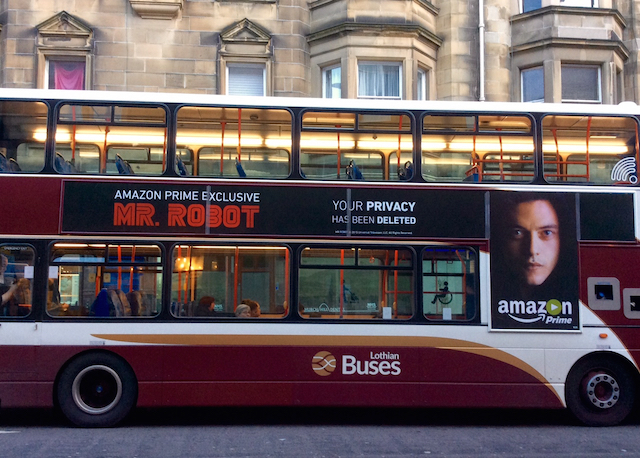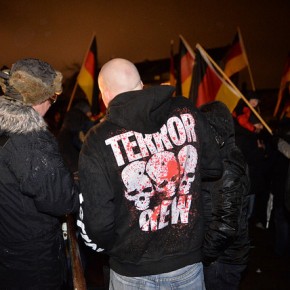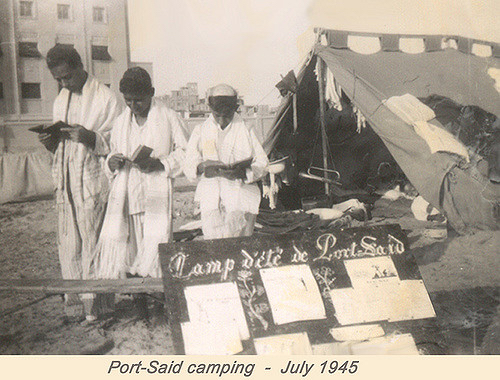Mr Robot is coming to the UK (as well as Australia and Germany). As well as migrating from the US, the 10-episode cyber-thriller (renewed for a second season) is changing platforms, leaving the USA Network for Amazon Prime, which holds the international rights.
Watching this programme online (VOD) through a platform that has mined the data from all my previous activity in order to make savvier offers makes the tagline, ‘Your privacy has been deleted’ (and its alternate, ‘Your democracy has been hacked’) chillingly appropriate. It speaks to the irony of the contemporary cultural landscape: Disruption is more distraction.
Something of a revolutionary zeitgeist inhabits the show. Show creator Sam Esmail credits the Egyptian uprisings of Arab Spring and there is certainly something of Occupy in there as well. Hacktivists, calling themselves ‘fsociety’, television’s latest version of Anonymous, seek to overturn the monopolising power of E Corp, which bears something approximating the Enron logo and which is called ‘Evil Corp’ courtesy of a point of view that situates us within the protagonist’s perspective. It would seem that corporate malfeasance, capitalism, and consumerism are the show’s targets. After all, it is Evil Corp that is responsible for the deaths of many, including the parents of the show’s (anti)hero, Elliot (Rami Malek) and his best friend, Angela (Portia Doubleday). More salient perhaps is the hacktivists’ mission: to wipe out debt.
Both story and performances make for appealing and occasionally gripping viewing. But as enjoyable as it is, how ‘revolutionary’ is it? A well-worn premise—an alienated young man against the world—does not undo radical promise, but narrative developments and casting might. Despite Rami Malek’s Egyptian background or the casting of an actress of South Asian origins (Vaishnavi Sharma) as his mother, the protagonist, Elliot Anderson is played (and read) as white. Further developments in family casting underscore the whiteness.
The white man is positioned at the centre of discontent, narrative and emotion. The supporting hacktivists of fsociety are diverse, ethnically and gender-wise, but so far are have no distinctive identities, with characterisation limited to quirks and outfits. In some ways, this makes sense. After all, Elliot is depressed, paranoid, and wilfully isolated; if the audience invited into the world of the protagonist, all others will be a mystery. In others, it’s frustrating. Although Angela develops a stronger story later in the series, the women are largely types: lost girl; the girlfriend/damsel in distress; and Lady Macbeth, goading the Swedish Psycho (Martin Wallström as Tyrell Welleck) to seize ever more power in the corporate kingdom. This last type could be more fun, one supposes, if not such a bearer of unfair demands on masculinity and the dangers of female power or ambition.
Utopian fantasies of casting and characterisation aside, it is the focus on the individual that really challenges the potential revolutionary content. People do hit the streets here (even if in riotous party mode), and there the aformentioned ‘fsociety’, but at the centre of each action lies the individual protagonist. Moreover, this is a deeply troubled individual, whose paranoia, hallucinations, and drug addiction supply an unreliable narrator and revolutionary. What is the impetus? Certainly his characteristics could be played as symptoms of living in a toxic society, but this sort of troubled antihero is the protagonist of Esmail’s cinematic inspirations: Fight Club (David Fincher, 1999) and Taxi Driver (Martin Scorsese, 1976). Each has its merits, but the focus is on the individual, cult leader or loner, and a struggle with disordered masculinity. Such depictions minimise the possibility of seeing insurrection as a reasonable response to the destruction brought on by global capitalism.
The tempered revolutionary potential of the content is amplified by the international digital delivery system: Amazon. This is a company that has received numerous critiques for its treatment of its employees. It is a company accused possessing an outsize ‘robber baron’ market force, with tremendous power and reach, much of it used to push out competitors. It is not entirely unlike E-Corp in that way.
Such impressions are radically different from those granted by Mr Robot’s original channel, the USA Network. Although its more inoffensive logo, ‘Characters Welcome’ might temper the rebellious charge of the programme, it remains a fitting home. USA used to broadcast Night Flight (1981-88), a compilation of countercultural programming: music videos, media art, censored and cult films. This broadcast site does not confer greater revolutionary potential on the show, but it certainly sharpens the potential irony of Amazon as the current distributor.
This is, of course, what disruption culture has offered up for the most part: A semblance of bottom up, grassroots development that is marketed alongside a practice that increasingly pushes out competitors and sidesteps civic or public duty. The sharing economy with companies like Airbnb and Uber make this manifest. Ostensibly offering opportunities for more work and income, the companies create legions of independent contractors who operate without basic labour protections. Protections are minimal, as can be wages. And this is only the tip of the issues generated by such new businesses.
That said, commerce has been draping itself in counterculture for some time. As Thomas Frank notes, defiance, resistance to mass culture, and ‘corporate revolutionaries’ are features of entertainment content and promotion. Counterculture is subdued and made handmaiden to capitalism and corporatism. What would be interesting in the case of Mr Robot is to see whether Mr Robot will address this pattern of co-optation in its second series, or continue as a symptom. Or, in all likelihood, how it will achieve both.
Photograph courtesy of the author.





